FSW Education fair 2024

On 6 June, the first FSW Education Fair took place. Teachers interacted with each other, followed workshops, listened to the interesting keynote speech and got inspired at the information market.
We would like to thank all participants and visitors for their enthusiastic contribution! Below you will find a photo report, key take-aways from workshop leaders and (soon to come) a podcast of the keynote speech.
-
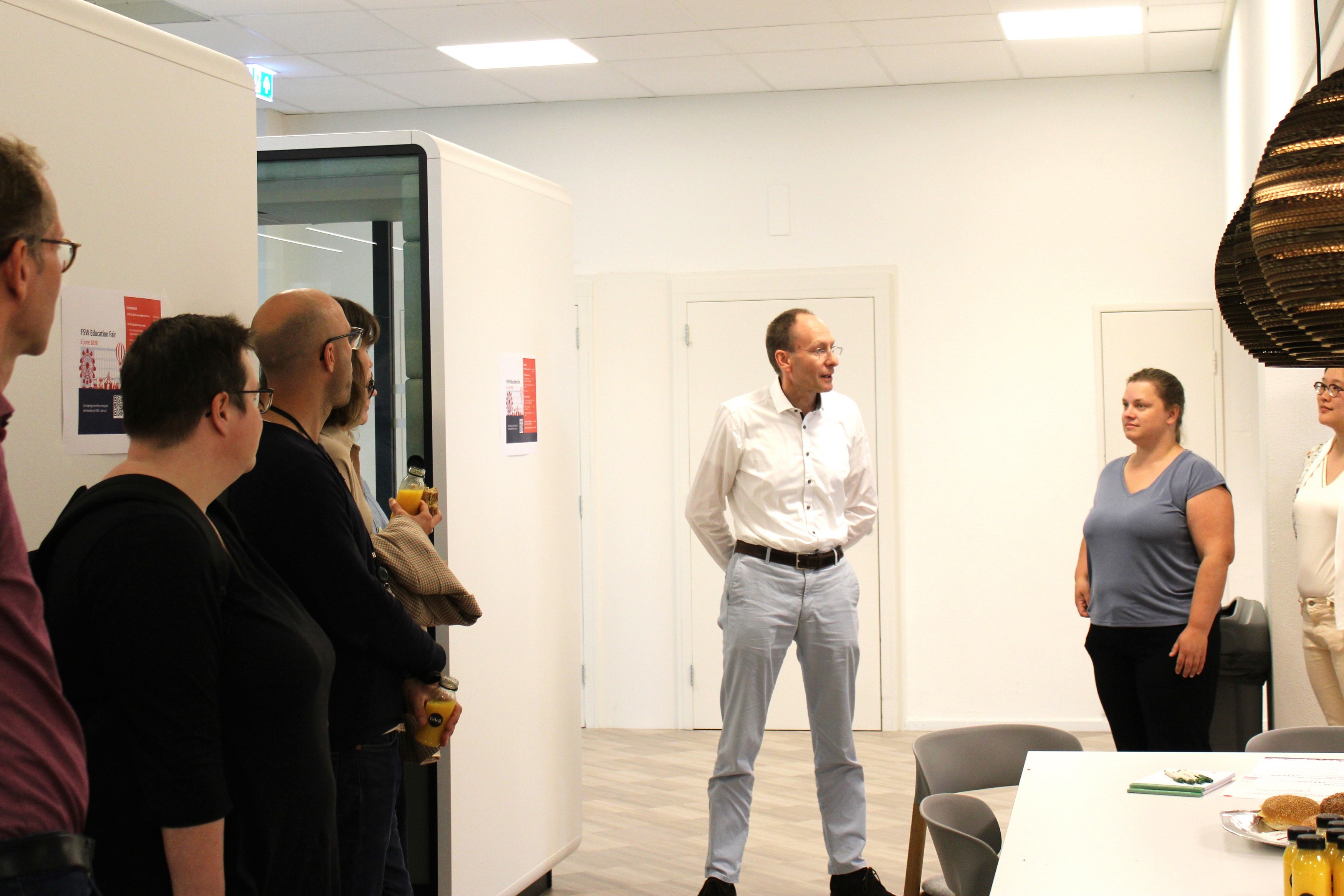
Opening by Kristiaan van der Heijden -
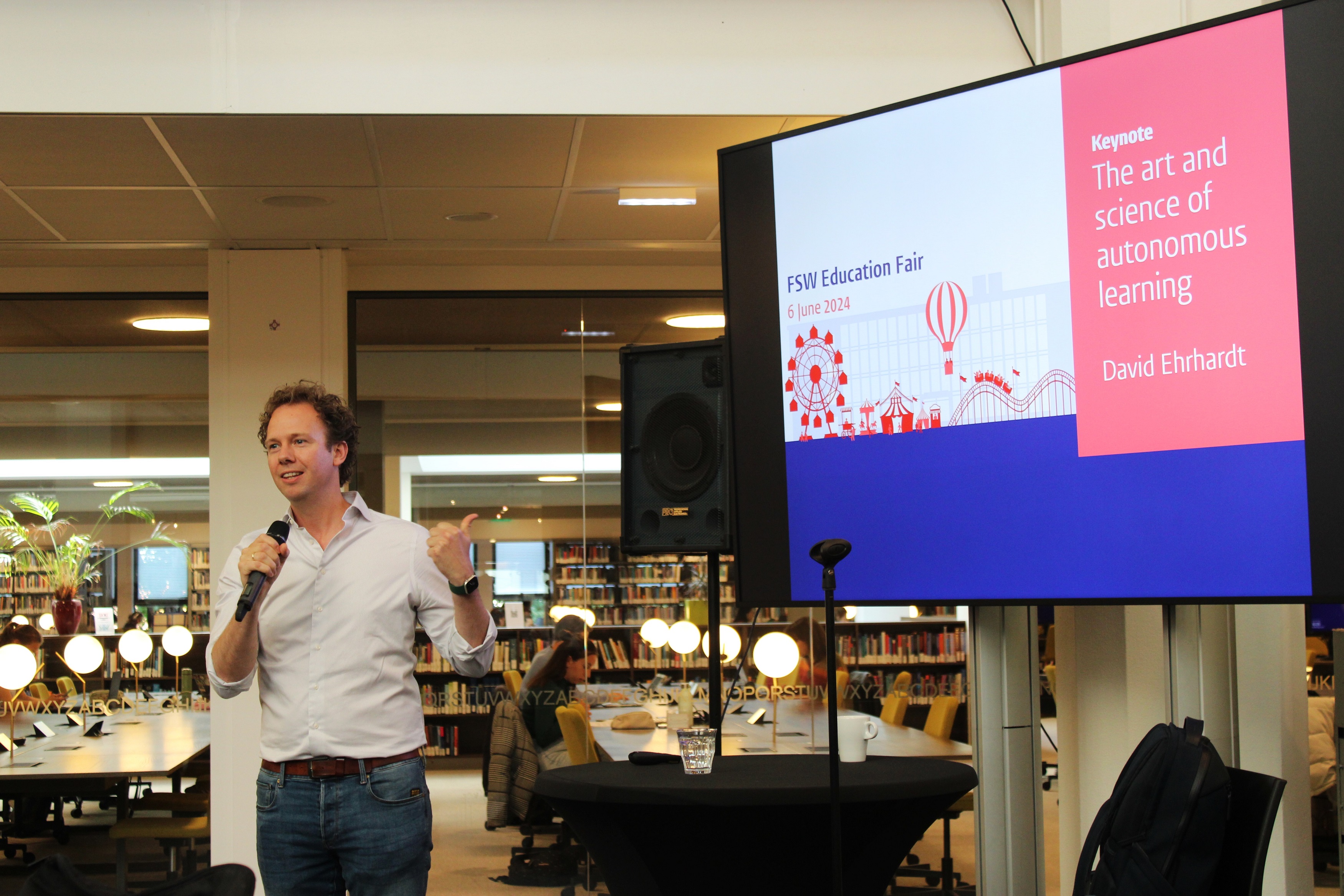
Keynote by David Ehrhardt -
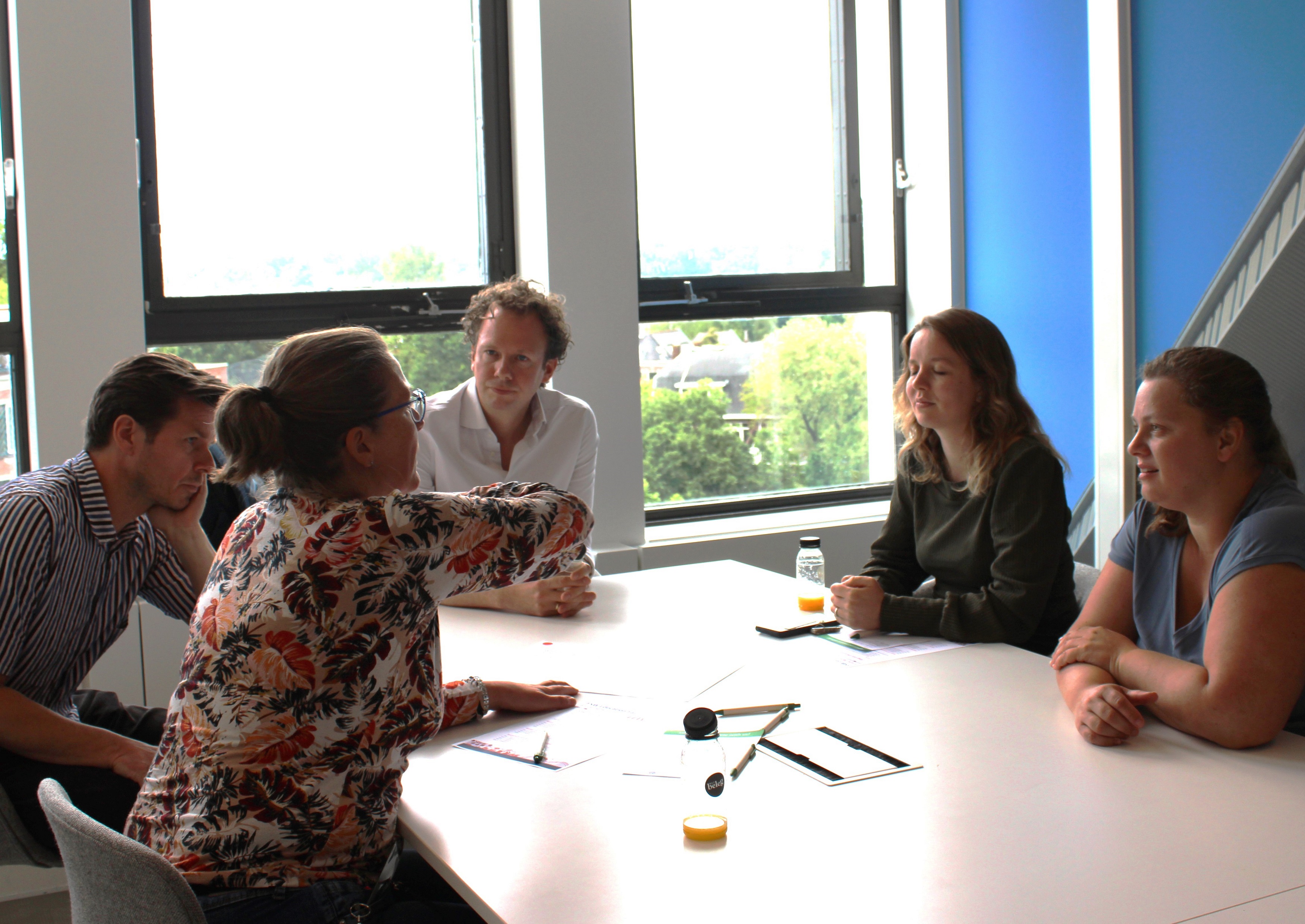
Pressure cooker discussion -
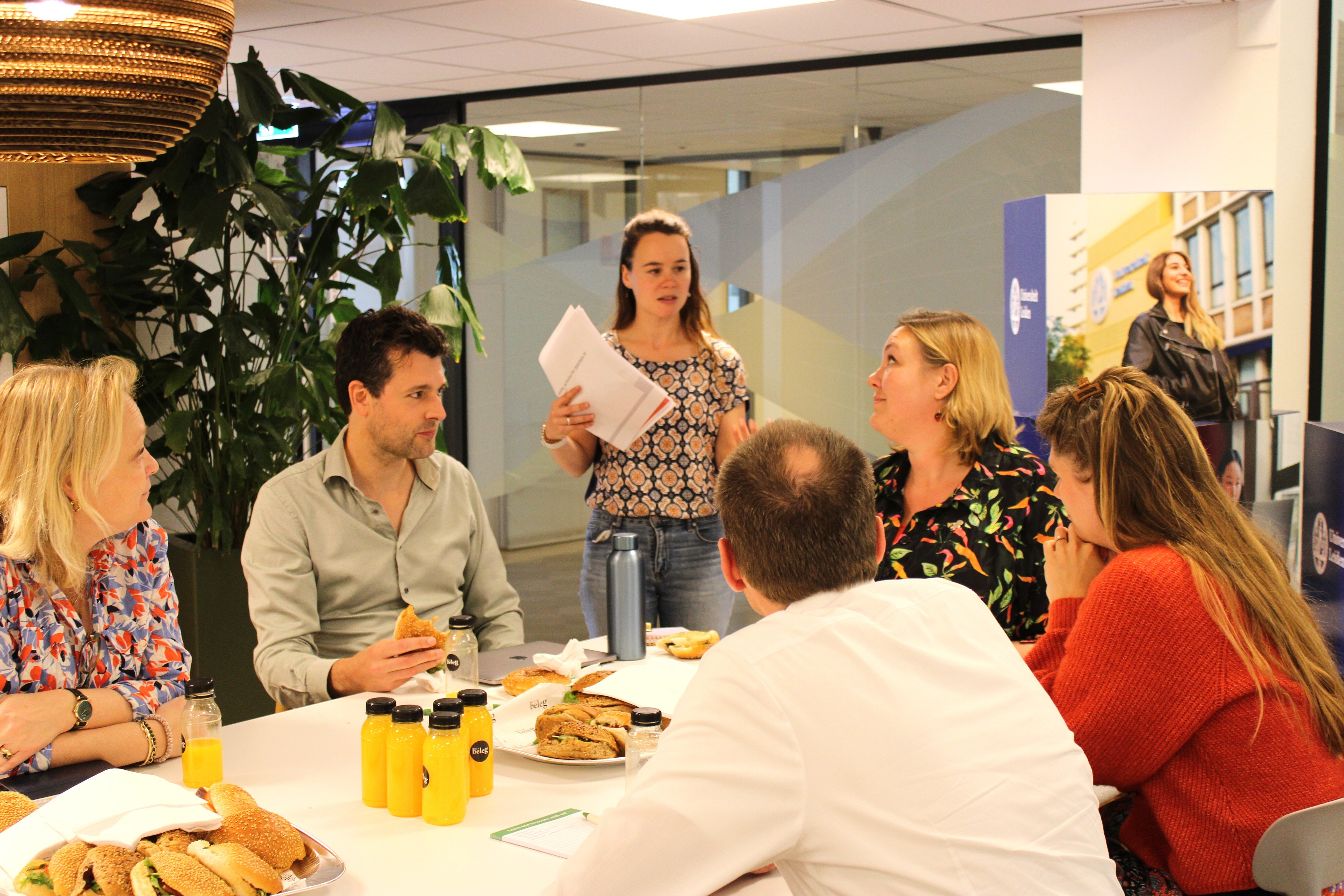
Pressure cooker discussion -
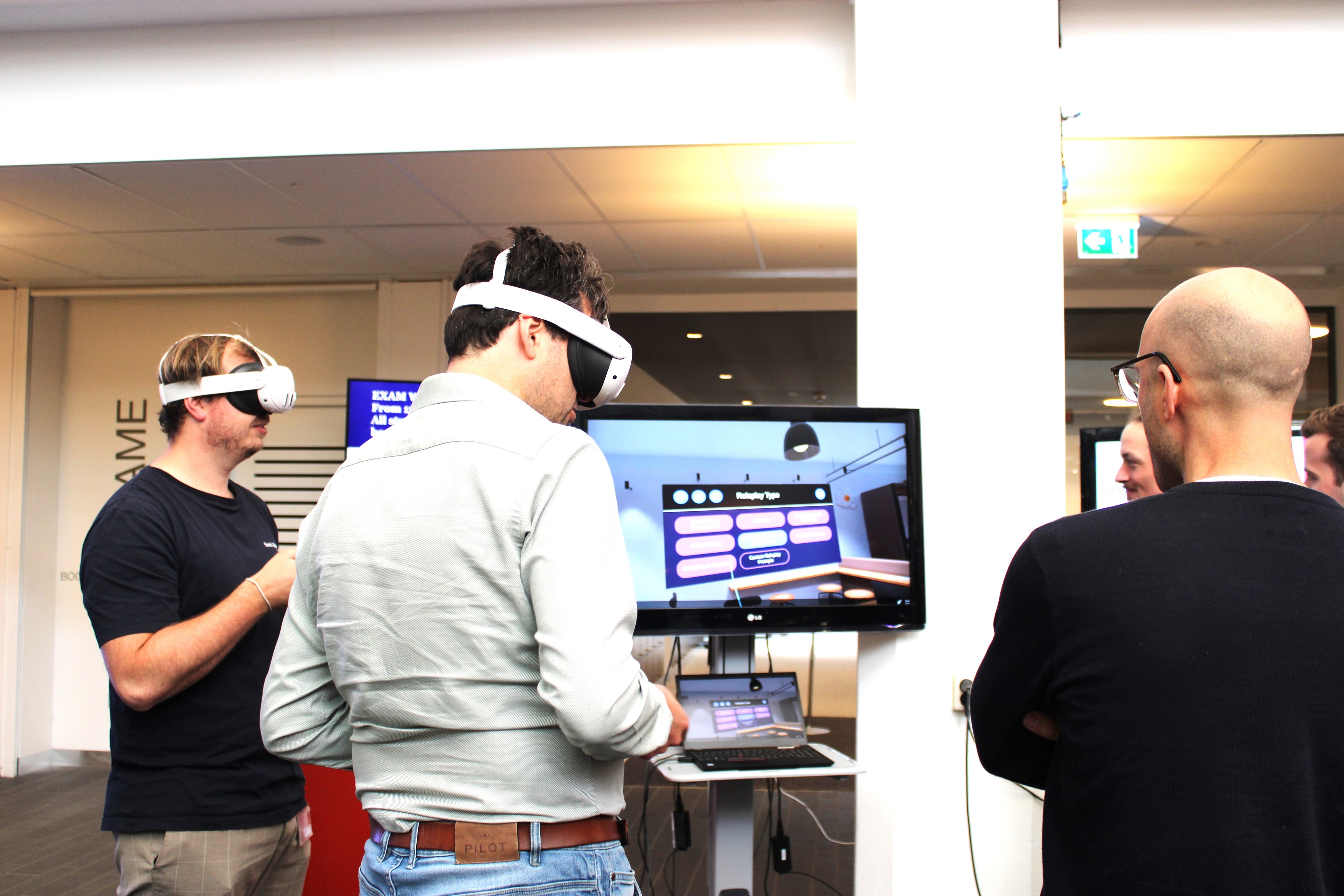
VR demonstration
Key take-aways
The workshops were led by enthusiastic lecturers and support staff. Here is what they would like to share with you:
Anthea Aerts hosted a pressure cooker session, where groups of lecturers, administrators and support staff engaged in a conversation about the value of contact time.
"The following ideas came out of the pressure cooker: In order to use contact time meaningfully, it is important to have a common understanding of the value of contact time. It is important that students learn to learn, and on the other hand that teachers provide activating education. Other factors can also be explored, such as flexible spaces, good communication between teachers and students and revising group sizes or the amount of contact hours."
Ellen van Reuler shared her experiences with making students responsible for seminars.
"When students prepare and lead the seminars, these sessions are often surprisingly interesting and educational. Especially if no grade is attached to this and if students can learn from each other (by making feedback part of the seminars)."
Mieneke van der Salm gave a workshop on GenAi for teachers.
"GenAI can be a useful tool, as long as there is always a 'human in the loop' and there is transparency about its use towards students."
Mieneke van der Salm also gave a workshop on Grass roots and shoots proposal writing.
"An innovative idea is always worth elaborating on in a Grassroots proposal, it doesn't have to be done alone, it can also be done together with colleagues. And in doubt whether it's innovative enough? Just contact me (or SOLO), maybe you don't even need an application to implement your idea and SOLO can help you with this!"
Laura Schneider led an intervision on teacher development.
"At FSW, a self-reflection tool has been developed to help you identify your teacher development needs. If you are interested, please feel free to contact me. Also if you want to organize an intervision, for example, or faculty sessions or trainings."
Suzanne Mol conducted a workshop on diversity in the lecture hall.
"Workshop participants had the opportunity to take the newly developed, online knowledge module on accessible lectures. This is part of the Comenius project "Effective teaching for all students." For both lecturers who already have their BKO or still have to obtain it, the module offers concrete and relatively quickly applicable tips. You become aware of what you already teach in an accessible way and learn what you can do to involve all students in your lectures. The workshop participants appreciated, among other things, that you can decide for yourself which module parts are relevant and that it includes practical examples as well as additional resources. There is also a handy accessibility checklist and a student feedback form to download to assess the perceived accessibility of your (revised) lecture. A follow-up step of this Comenius project is to translate the module into English and offer it via the Teachers Platform FSW. We are also considering organizing group meetings where you can exchange experiences and feedback with fellow teachers who are also going through the module. If you would like to participate in such a group that meets approximately five times, please indicate your interest in advance by sending an email to: comenius.toegankelijkonderwijs@fsw.leidenuniv.nl"
| 13:00 |
Lunch & Pressure cooker, Faculteitsbureau 4e verdieping |
| 14:00 | Workshop round 1 |
|
Handing over control: Organising student-led sessions – Ellen van Reuler (Political Science), 1A.25 |
|
| GenAI for teachers - Mieneke van der Salm (SOLO), 1A.37 Generative AI is here to stay and we are learning more about its applications every day. ChatGPT and its likes have a lot of consequences for the way we teach and assess, but they also offer opportunities, both pedagogically and professionally. Join SOLO’s Mieneke van der Salm to explore the possibilities that GenAI (ChatGPT) offers teachers to both reduce workload and to improve the quality of their teaching. |
|
| Diversiteit in de collegezaal: toegankelijke hoorcolleges in 3 stappen – Suzanne Mol (Pedagogische Wetenschappen), 1A.01
This workshop is in Dutch only. Wil je aan de slag met het inclusiever of toegankelijker maken van je hoorcolleges, maar weet je nog niet goed hoe? In deze workshop krijg je toegang tot de nieuwe, online kennismodule die is ontwikkeld binnen het Comeniusproject "Effectief Onderwijs voor Alle Studenten". Neem je laptop mee en pas de drie stappen van deze kennismodule direct toe op de slides van één van je eigen colleges! |
|
| 15:00 | Workshop round 2 |
| Quick wins in teaching: small changes that impact your efficiency and effectiveness – Anthea Aerts (LLInC), 1A.01 Do you struggle with managing your teaching time? Do you want students to be more engaged? Are you open to making changes, but unwilling to completely overhaul your course or teaching style? If your answer to these questions is 'yes', then this might be the workshop for you! This workshop is designed to share practical and easy-to-implement strategies that can make a difference in your teaching. Learn from and share experiences with colleagues in this interactive session. |
|
| RIDE to the future: planning your teacher development – Laura Schneider (FSW Onderwijsbeleid), 1A.25 Do you want to identify your strong suits and development possibilities in terms of didactical skills, educational design, and more? Would you like to match your development needs to the opportunities at the faculty and university level? Join the intervision meeting, where you will work with the newly developed RIDE instrument, together with some of your colleagues and Laura Schneider (who can tell you more about professional development at our faculty). Everyone is welcome: those who just started teaching, those who’ve recently obtained their BKO, as well as seasoned professionals! |
|
| How to write a Grassroots/Grass Shoots proposal – Mieneke van der Salm (SOLO), 1A.37 Each academic year the FSW awards Grassroots and Grass Shoots grants to stimulate and support educational innovation. But how to write a successful proposal? Why do you need to formulate a theory of change? And what does the committee consider innovative? Join Grassroots/Grass Shoots coordinator Mieneke van der Salm (SOLO) to learn the answers to these questions and get more tips on writing your Grassroots or Grass Shoots proposal. |
|
| 16:00 | Keynote + Q&A: The art and science of autonomous learning - David Ehrhardt (Leiden University College), Centrale hal
Autonomous learning is one of the most important skills that higher education can help students develop. The award-winning Learning Mindset (LM) project uses an iterative model of autonomous thinking and learning that combines the skills of self-regulation with the reflective process of building a dynamic understanding of one’s own goals and capacities. Based on the experiences accumulated in the LM project, David will outline some ways in which this complex notion of autonomy can be translated in to simple - but powerful - teaching tools to promote autonomous learning. After the talk, you can easily try these in your own classes. Early-stage research into the effects of these tools shows that this can result not only in increased student motivation, better learning attitudes and better outcomes, but also in more rewarding (and fun!) teaching experiences. |
| 17:00 | Informationmarket & Drinks, Centrale hal |
|
Virtual Speech: improving student pitching skills with VR – Francesco Walker (Psychology), Maarten Struijk (SOLO) |
|
|
Grassroots showcase: The Student Experience for Teachers in Brightspace - Rianne Weber |
|
|
Opportunities for educational innovation at a university and national level - Anna Terra Verhage (SAZ) |
|
|
Opportunities for educational innovation at an international level - Theo Poumpalov and Ivo Bles (SOZ/International Relations) |
|
| And more... |
